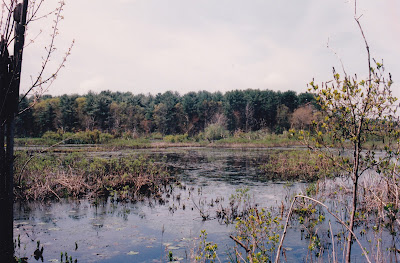 |
| The Green Harbor River in the author’s backyard. |
Every summer, a symphony is performed outside my window. This music has never been recorded, never even written down, and yet it’s a masterpiece, an intricate, brilliant work of art, evocative of a certain time, a certain place: springtime in my back yard.
There’s the low hum of mosquitoes, the high pitched twitter of peepers, and a chorus of other forest and pond sounds in between, accented at times with the percussive plunk of bullfrogs and the honking of geese. Every so often a duck chimes in, or even an owl. Sometimes a train whistle or an airplane flying overhead provides counter-melody. This is the song of the suburban landscape — neither city nor country — where nature and neighborhoods sit shoulder to shoulder.
I’d be hard-pressed to describe this symphony in specific detail. I’d recognize it in a moment, but if you asked me to isolate and identify its component parts, I wouldn’t know where to begin. I grew up hearing these sounds, but it wasn’t until I moved away and came back that I really began to appreciate them. Now, no matter where I am, I associate spring peepers with home.
I grew up in a residential area in Marshfield. The house, nestled among pines, oaks and beeches, is set further back from the street than most of the others in the neighborhood, so that no matter which window you choose to look through, you see trees.
Behind the house, the yard slopes down to a swamp, which leads into a manmade pond so long that one cannot see from end to end. The pond is bordered on one side by the cranberry bogs it was constructed to irrigate, and on the other by a freshwater marsh. Forest and an occasional house make up the other two sides.
Growing up, it never occurred to me that my family lived in a special spot. I assumed that everyone had a forest or a pond in their back yard. But as my adventures took me deeper into the maze of streets that make up my neighborhood, I discovered that a back yard pond was indeed a rarity — something to cherish.
I gauge the seasons by the sounds of my back yard. It’s pretty quiet there in the winter, but once spring arrives, it begins to liven up, first with birds, then with peepers. The late essayist EB White, reporting to the New Yorker magazine from his farm in Maine one winter, summed up his eagerness for spring with these words. “I will feel a whole lot better,” he wrote, “when I hear the frogs.”
The frogs are what does it for me as well. Something about that cheerful chirp the spring peepers make — the pure joy in it — fills me with renewed energy. Spring is the season of rebirth, and every year it is the sound of the peepers more than anything else that brings me out of hibernation.
The sudden stretch of summer weather we enjoyed at the end of March brought the peepers out in full force. Returning one evening from a bike trip to the beach, I took a short cut on the fire road that runs through the woods along the pond; night was falling, and as soon as I turned off the highway, onto the trail, I could hear the frogs. The chirping grew louder until, at a certain part of the trail where there was water on both sides, it was so loud that if I hadn’t been pedaling furiously in order to get home before dark, I would have had to cover my ears.
Several hours later, when I sat down to write this, the frogs were still at it. They continued all night, and will do so every night, right on into summer, singing me to sleep. The days will grow longer and warmer, and one by one, each bud, each blossom, each creature, great and small, will emerge from its winter rest.
by Kezia Bacon, Special To The Mariner
April 1998
Ms. Bacon’s articles are provided by the North and South Rivers Watershed Association.
